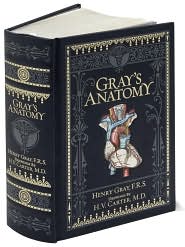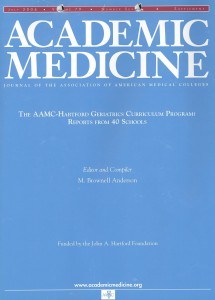Trust is the name of the game when we visit our physicians. We trust them to have our health as priority #1, that they will be honest and upfront with us, and we trust that they are competent and skilled in their practice. We have good reason for this trust, especially when it comes to our doctors’ competence. We all know that physicians spend years and years in grueling, rigorous education and training. Medical schools accept the cream of the crop from undergraduate institutions. But what are these bright, hard-working medical students really learning and will it actually help them care for us and our loved ones, especially if the loved one is 85 years old with diabetes, cognitive impairment, and a history of falling?
competence. We all know that physicians spend years and years in grueling, rigorous education and training. Medical schools accept the cream of the crop from undergraduate institutions. But what are these bright, hard-working medical students really learning and will it actually help them care for us and our loved ones, especially if the loved one is 85 years old with diabetes, cognitive impairment, and a history of falling?
This has been a fundamental question posed by many of us in the aging and health field, including our partners at the Donald W. Reynolds Foundation. Like us, Reynolds has dedicated millions of dollars to addressing the very real gaps that exist in educating health professionals in the care of older adults. I just attended the 9th annual meeting of the Reynolds Aging and Quality of Life grantees in St. Louis and was struck by how intertwined our foundations’ work has been. Since 2000, one component of the Reynolds initiative has awarded grants to 40 academic health centers to strengthen their geriatrics training at the medical student and resident level. These grantees come together every year to share the progress they continue to make and the educational tools they have developed.
 Our program director, Chris Langston, reminded me that at the same time this Reynolds initiative started, we were also doing our part through geriatrics-focused curricular change grants to another 40 medical schools (with some Reynolds overlap) in partnership with the Association of American Medical Colleges (AAMC). He referred me to a 2004 special edition of the AAMC’s journal, Academic Medicine, which highlights our work. A concise and articulate forward to the edition outlines our rationale and program design. Profiles of the medical schools’ efforts show incredible innovation and creativity in weaving geriatrics throughout existing curricula. While much has been accomplished through both the Reynolds and Hartford grants, as well as our subsequent partnership with the AAMC and American Geriatrics Society to articulate minimum geriatric competencies for medical students, many of the issues raised years ago still hold very true and need to be revisited. The forward notes:
Our program director, Chris Langston, reminded me that at the same time this Reynolds initiative started, we were also doing our part through geriatrics-focused curricular change grants to another 40 medical schools (with some Reynolds overlap) in partnership with the Association of American Medical Colleges (AAMC). He referred me to a 2004 special edition of the AAMC’s journal, Academic Medicine, which highlights our work. A concise and articulate forward to the edition outlines our rationale and program design. Profiles of the medical schools’ efforts show incredible innovation and creativity in weaving geriatrics throughout existing curricula. While much has been accomplished through both the Reynolds and Hartford grants, as well as our subsequent partnership with the AAMC and American Geriatrics Society to articulate minimum geriatric competencies for medical students, many of the issues raised years ago still hold very true and need to be revisited. The forward notes:
“As it has in the face of earlier technological and social changes, medical education will need to adapt to meet the challenges of an aging population. Increased emphasis on chronic as opposed to acute care, broader awareness of the physiological changes associated with aging, and better ability to help people negotiate the treacherous border between under- and over-treatment are among the issues that are obvious to us even now, but probably are only part of what will be needed in the uncertain future.”
The future still remains uncertain and medical education needs to continually adapt, but we are gathering some sense of what may be needed next. It may be more interdisciplinary/interprofessional team training, which as an idea seems to be gaining traction (the Reynolds Foundation made grants specifically in this area in 2010, and the Josiah Macy Jr. Foundation, Hartford, and others are collaborating on potential future interprofessional work). As the country’s population grays, it is also becoming less white and more ethnically diverse, calling for more emphasis on cultural competency and the reduction of health disparities. Many would likely agree with Arnie Milstein, who has written about the implicit social contract between medical schools and the public. He points to the need for medical students to develop skills like clinical process change and innovation development to respond to society’s need for lower-cost, higher-value health care.
We would love to hear your ideas on what’s really needed now in medical education to improve care of older adults. Feel free to comment on this blog or email us.
I leave tonight for the AAMC annual meeting and am looking forward to learning about medical education from real insiders. I’ll be reminding the AAMC of our past work together to improve the geriatrics preparation of medical students, and I’ll be listening for new opportunities to continue to improve medical education. I want to be able to trust that what our physicians learn as young medical students will truly help them care for us and our loved ones as we age.
